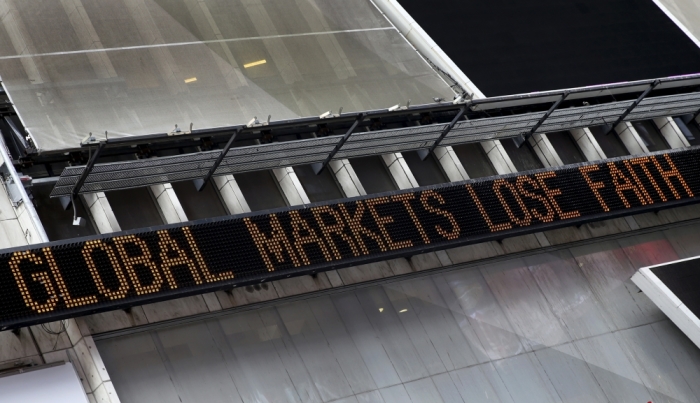Why the Freedom of the Market Is Best For the World

Isn't it time we consider a paradigm shift in our approach to alleviating poverty? History shows there's no better answer to the challenge of poverty than the free market. "No other system has so quickly and so globally lifted the poor out of poverty," the late theologian Michael Novak wrote of capitalism.
Consider that a billion people have escaped extreme poverty since 1990, owing to the embrace of free markets. It's no coincidence that this dramatic decline in poverty occurred as the Soviet Union's Marxist-Leninist experiment imploded. Indeed, it is capitalism—not communism or socialism—that has lifted some 500 million people out of poverty in China in the past 30 years.
No government—no matter how benevolent or powerful—can meet all the needs and wants of all people. Consider the Soviet Union, Venezuela, and North Korea. These regimes have tried various forms of socialism. And they have failed to meet the basic needs of their people. But don't take my word for it.
- Mikhail Gorbachev recalls how, as the Soviet Union collapsed around him, "I was ashamed for my country—perhaps the country with the richest resources on earth, and we couldn't provide toothpaste for our people."
- Communist North Korea's annual GDP is $28.5 billion (placing it somewhere below 133rd in the world), per-capita GDP $1,700 (215th in the world) and average life expectancy 70 years. Capitalist South Korea chose a different path: free markets, free enterprise, and free government. South Korea's annual GDP is $1.93 trillion (15th in the world), per-capita GDP $37,700 (48th in the world) and average life expectancy 82 years. [Photo above illustrates these numbers and stifled development in North Korea vs. South Korea.]
- The Chile–Venezuela pairing offers a similarly stark contrast, as economic historian John Steele Gordon details: "Since 1975, the Venezuelan economy has shrunk by 17 percent. Chile's has grown by 287 percent." The reason: Chile abandoned socialism in 1973, while Venezuela embraced it in 1999.
At both the global and the personal level, the free market—without coercion—meets society's needs more efficiently and more effectively than the alternatives, thanks to what Adam Smith called "the invisible hand." As Smith observed,
Man has almost constant occasion for the help of his brethren, and it is in vain for him to expect it from their benevolence only.
In other words, we need each other, but we can't always count on the generosity of others—and arguably shouldn't, for that matter. That's where the free market comes into play. "It is not from the benevolence of the butcher, the brewer or the baker, that we can expect our dinner, but from their regard to their own interest," Smith explained.
Of course, God wants us to be benevolent, and he asks his people to use their wealth to help those in need (1 Jn. 3:17). Where and when the free market falls short in meeting the needs of our neighbors is where and when followers of Christ must step up and step in.
Freedom: The Path to Progress
Yet it seems Americans are increasingly looking elsewhere—to government, to supra-national organizations, to NGOs—to help those in need and "make the world a better place." This is understandable in the sense that God expects us to be good stewards of his creation, to be good neighbors, to be peacemakers. But again, the free market is more effective here than socialism and redistribution of wealth by the state. For example:
- Empirical evidence shows that economic freedom correlates with a healthier environment and cleaner air. The 20 highest-ranked countries on the Fraser Institute's economic freedom index have air-pollution levels almost 40-percent lower than the 20 lowest-ranked countries. And it pays to recall that communist governments show nothing but contempt for the environment (see here and here).
- Economic freedom also promotes social progress. The Fraser Institute has found that higher levels of economic freedom correlate with higher levels of civil rights, less civil strife, less corruption, higher life expectancy and higher literacy rates, and the Heritage Foundation concludes that higher levels of economic freedom lead to "more education opportunities, better health care and higher standards of living."
- Nations with high levels of economic freedom rate the highest on measures of political freedom and religious freedom—regardless of geographic placement, ethno-religious composition, or historical background.
- Free markets reduce the risk of conflict. The expansion of free markets, according to a 2014 study, "marginalizes violence because it binds people meaningfully in a way suited to addressing the collective dilemmas stemming from violence." With economic freedom, the study concludes, "people gain when they produce goods and services others desire in mutually beneficial exchange," and competing groups "become customers, employees, employers, suppliers"—rather than enemies in a zero-sum struggle over scarce resources.
Though Imperfect, the Free Market is the Best Path to Flourishing
Not only does the free market deliver better outcomes for society; but by allowing each person to pursue his or her God-given talents to the best of his or her ability, the free market delivers better outcomes for individuals.
No, that doesn't mean every individual will flourish and succeed under the free-enterprise system. Some will fail. Some will fail repeatedly. Some will have more success than others. But surely a system that allows individuals to develop and use their talents, even if they fail, is better than a system that constrains or prevents individuals from even trying to use their talents in an effort to preemptively level the playing field.
The free market is anything but perfect. It has flaws and shortcomings, excesses and limitations—mainly because of its imperfect participants. But it's more effective and more just than any other economic system. Our challenge is to help others, especially millennials, see that free enterprise and free markets meet the needs of individuals—and society—better than the alternatives.
If people cease to recognize this truth—in America and in the rest of the world—America and the rest of the world will be worse off in the decades to come.
This article is copied with permission from the Institute for Faith, Work & Economics (www.tifwe.org). The original article appeared here. IFWE is a Christian research organization committed to advancing biblical and economic principles that help individuals find fulfillment in their work and contribute to a free and flourishing society. Visit https://tifwe.org/subscribe to subscribe to the free IFWE Daily Blog.




























